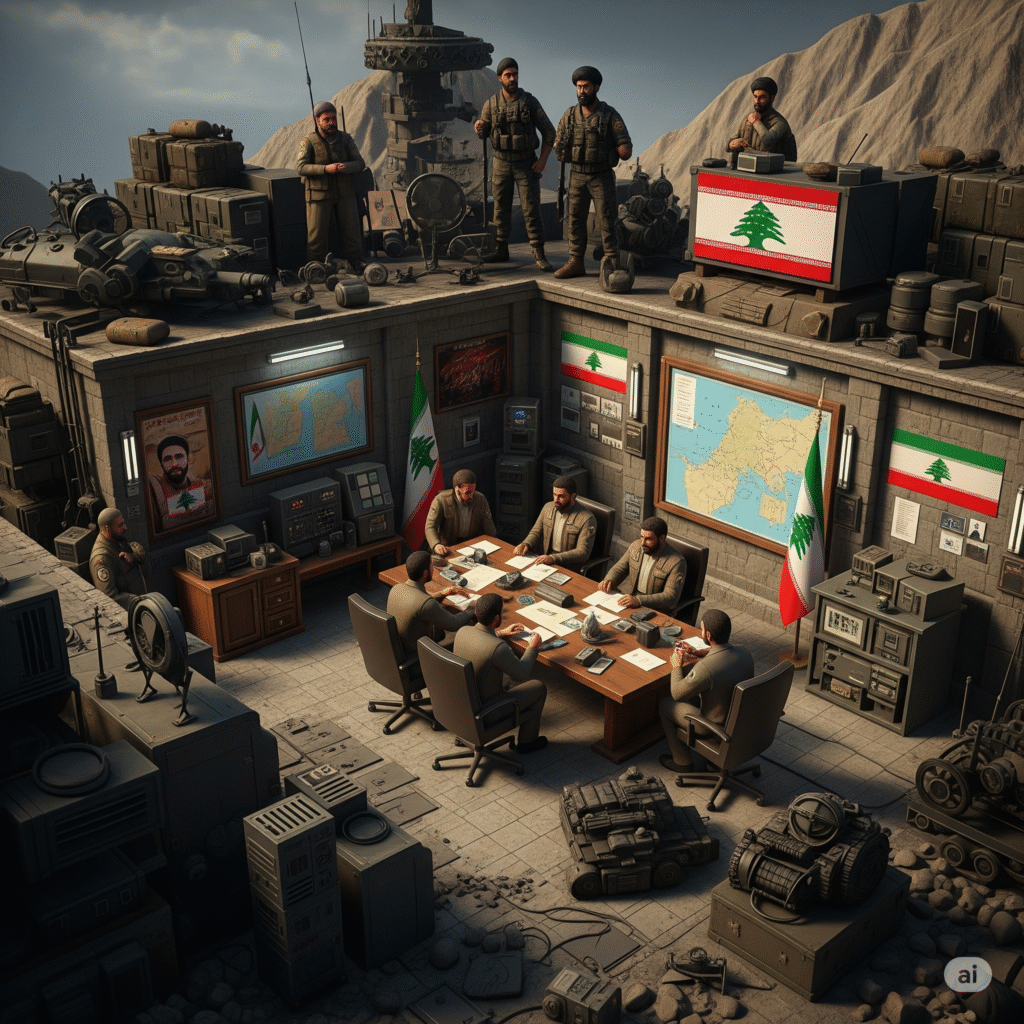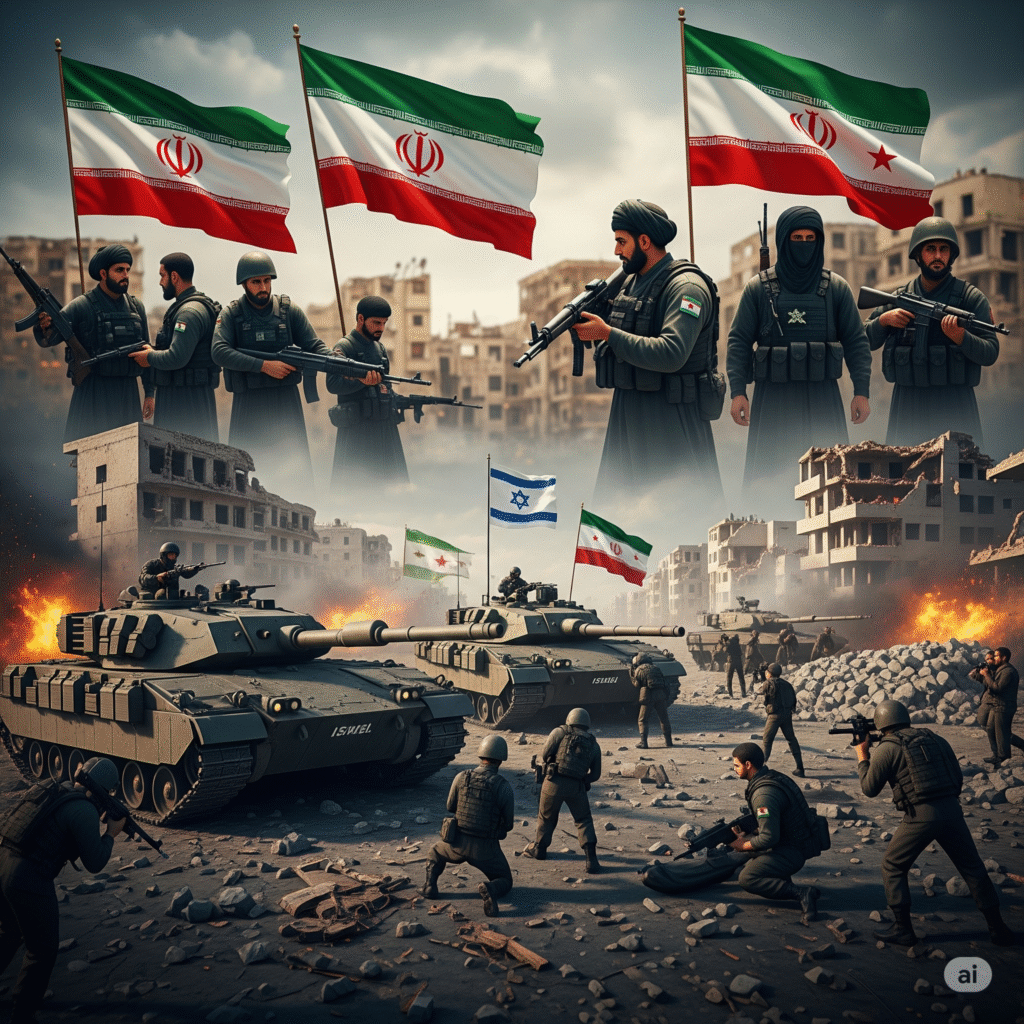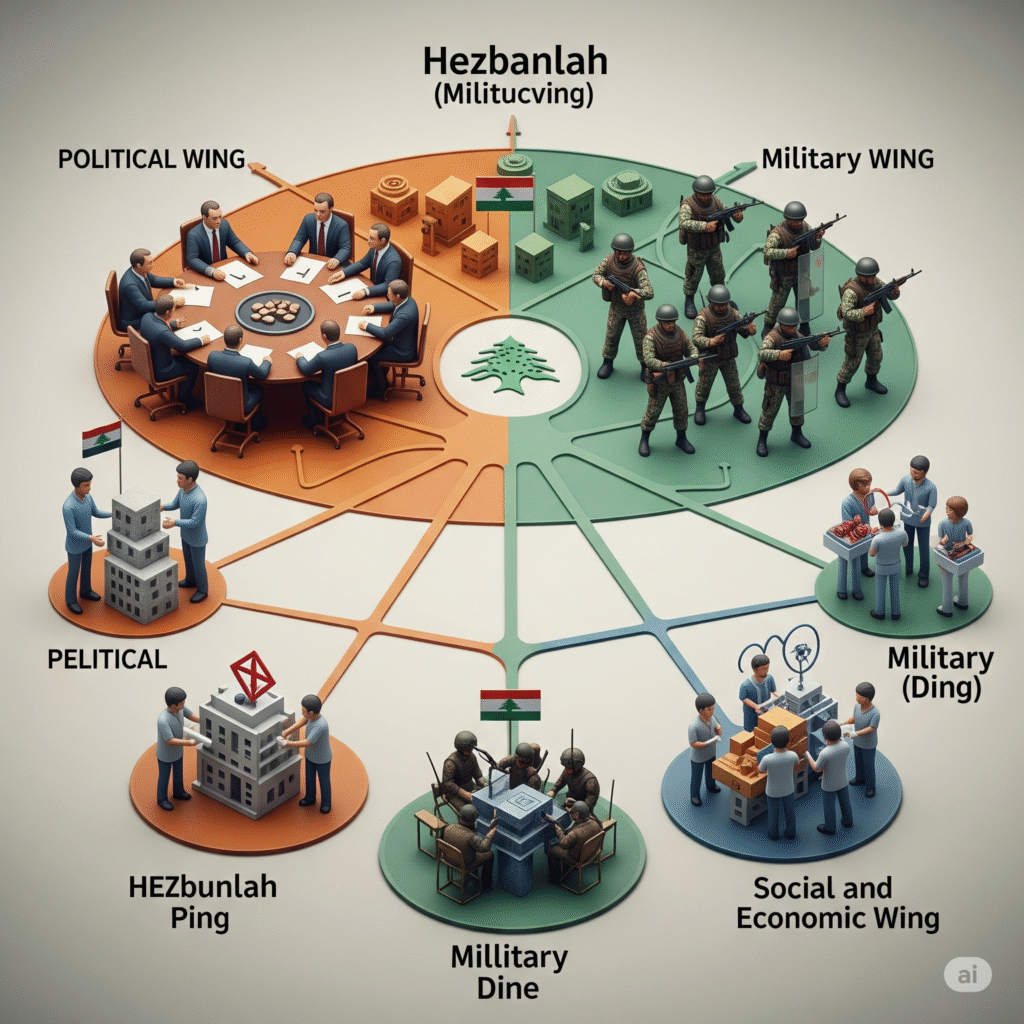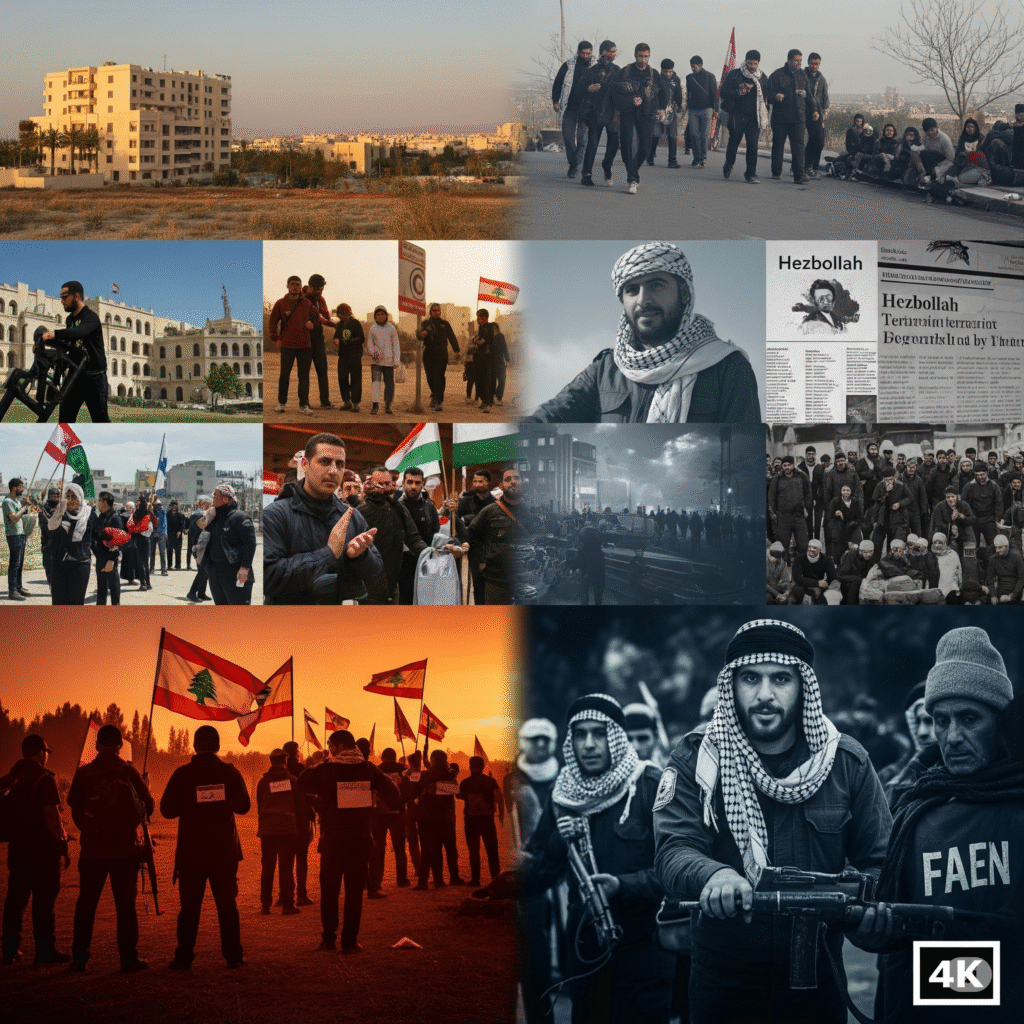
Introduction to Hezbollah
Hezbollah It is a Shia Islamic organization and political party headquartered in Lebanon. The organization was established in the early 1980s with the help of Iran and emerged mainly as a resistance against Israel and Western powers .
Founding and objectives of Hezbollah
Establishment:
- Hezbollah was founded in 1982 , when Israel invaded Lebanon.
- It was formed under the influence and support of the Islamic Revolution of Iran.
- Iran’s Islamic Revolutionary Guard Corps ( IRGC) provided training and military support to the organization.
Main objectives:
- Resistance against Israel – It is seen as an anti-Israel organization and has been involved in confrontations with Israel several times.
- Defense of the Shia Community in Lebanon – This organization represents the Shia Muslims of Lebanon and protects their rights.
- Establishment of Iran-backed Islamic regime – This organization is in favor of establishing an Islamic government in Lebanon in accordance with the ideology of Iran.
Structure and power of Hezbollah
1. Political branch:
- Hezbollah actively participates in Lebanese politics and has a strong presence in parliament.
- It contests elections as a political party and also participates in the government.
2. Military branch:
- Hezbollah has a strong militia , which has access to advanced weapons and missiles.
- It has been receiving military assistance from Iran and Syria.
- Its military capabilities were demonstrated in the 2006 Israel-Lebanon War.
3. Social and economic programmes:
- Hezbollah also operates a number of social programs to help education , health services, and the poor.
- provides hospitals , schools and other public services within its area of influence .
Hezbollah and the Global Perspective
- The United States , the European Union and several other countries have declared Hezbollah a terrorist organization.
- Iran and Syria recognize it as a legitimate resistance organization and support it.
- Hezbollah’s activities are primarily seen in Lebanon , Syria , Israel , and other Middle Eastern countries.
conclusion Hezbollah is a complex organization that is not only a military force but also plays an important role in Lebanon’s politics and society. The organization remains an influential player in regional conflicts and is also a topic of discussion in international politics.
Founding and objectives of Hezbollah

Establishment:
- Year: Founding of Hezbollah 1982 It happened in.
- background:
- In 1982 Israel invades Lebanon and occupied southern Lebanon.
- In response to this attack, Iran supported Shia militia groups They united and formed Hezbollah (meaning: “Party of Allah”).
- Iran’s Islamic Revolutionary Guard Corps ( IRGC) Provided training , financial and military support to Hezbollah.
- It also received support from Syria , which used it for its own interests.
Main objectives:
- Resistance against Israel –
- To drive Israel out of Lebanon and oppose its expansionist policies.
- Considering Israel as its biggest enemy and waging an armed struggle against it.
- Security and leadership of the Shia community in Lebanon –
- Protecting the rights of Shia Muslims in Lebanon.
- To influencing society and politics according to Shia ideology.
- Establishment of Islamic rule
- To establish an Islamic government in Lebanon according to the Iranian ideology (Wilayat-e-Faqih).
- Opposing western influence and secularism.
- Increasing Iran’s influence in the Middle East –
- Other Iran-backed groups such as Hamas , Houthi insurgents and Iraqi militias to collaborate with.
- Supporting the Assad government in Syria.
conclusion:
Hezbollah was originally An organization formed to resist Israel and protect the Shia community it was , but over time it An organisation with a strong military force , political party, and regional influence It plays an important role in Lebanese politics and the conflicts of the Middle East.
Structure and Power of Hezbollah

Structure and power of Hezbollah
Hezbollah is a complex organization , whose structure three major branches It is divided into:
- Political branch
- Military branch (militia)
- Social and economic branch
1. Political branch
- Hezbollah An influential party in Lebanese politics serves as.
- it Representation in the Lebanese parliament and government keeps it.
- Its main political leadership Hassan Nasrallah It is under the command of , who has been the General Secretary of the organisation since 1992 .
- The organization has emerged as a strong representative of the Shia community in Lebanon and maintains close ties with Iran and Syria.
- formed alliances with other Shia , Sunni, and Christian groups Maintains its hold in national politics .
2. Military branch (militia)
The most powerful branch of Hezbollah is its Military wing , which has been adopted by many countries (eg. USA , European Union , Saudi Arabia) Terrorist organizations Has been declared.
(A) Weapons and military capability
- Next to Hezbollah Modern missiles , drones , rockets, and anti-tank weapons Are.
- near it Guerilla warfare and conventional military strategies are trained fighters in.
- Iran and Syria continue this Weapons , funding and military training we supply the .
- 2006 Israel–Lebanon War In 2015, Hezbollah gave a tough fight to the Israeli army , due to which its military capabilities were recognized by the world.
- has also participated in military operations in Syria , Iraq and Yemen.
(B) Military organisation
Hezbollah’s military structure is like an organized army , consisting of several divisions:
- Special Forces ( Radwan Unit) – This is the most dangerous and advanced military unit of Hezbollah.
- Rocket and missile units – Hezbollah claims to have over 100,000 missiles , ready to attack Israel.
- Cyber and Intelligence Wing – It spies on Israel , the US and other enemy organisations and also specializes in cyber warfare.
3. Social and economic branch
Hezbollah is not only a military and political organization , but it Social and economic functions in Lebanon He is also active in.
(A) Social Programme:
- to the poor and the families of the martyrs Financial Aid Provides.
- Operates hospitals , schools and religious centres.
- Is involved in reconstruction and relief work in war-torn areas.
(B) Economic power:
- Hezbollah Business and financial networks in Lebanon and other countries It operates.
- This Millions of dollars in aid from Iran every year It is available.
- it Illicit trade , money laundering, and drug trafficking Many countries allege that it also receives funding from .
Assessment of Hezbollah’s total strength
- Political power – influence in the Lebanese government and parliament.
- Military power – An organised and powerful militia , equipped with modern weapons.
- Economic power – access to money and resources internationally.
- Public support – Has widespread support from the Shia Muslim community and some other sections.
conclusion
Hezbollah is a Multidisciplinary Organization , whose political , military and social branches make it a Regional power Its influence is seen not only in Lebanon but throughout the Middle East. It Iran-backed networks is an important part of the and remains a major challenge for Israel. Hezbollah and the Global Perspective
Hezbollah and the Global Perspective

Hezbollah and the Global Perspective
Hezbollah is the only Not a local or national organization it is , rather, a Influential organizations at the regional and global levels It has been made. It has been accepted by different countries and organizations. different viewpoints Some call it A Resistance Movement , while others consider it to be A terrorist organisation see as.
1. Global perspective on Hezbollah
(A) Supporting countries and organizations
Some countries and groups support Hezbollah Legitimate resistance organizations believe in it and openly support it. These mainly include:
- Iran:
- Hezbollah’s biggest supporter Iran Is.
- This Hundreds of millions of dollars every year Provides financial aid of .
- of Iran Islamic Revolutionary Guard Corps ( IRGC) to Hezbollah Military training , weapons and technical support Provides.
- Hezbollah Iran’s expansionist policy It is part of the and is used by Iran to expand its influence in the Middle East.
- Syria:
- The Syrian government , especially Bashar Al Assad The regime supports Hezbollah .
- Syria to Hezbollah arms and logistics supplies It helps in.
- Hezbollah defends Syrian civil war ( 2011–2020) Fought on the side of the Assad government.
- Russia:
- Russia supports Hezbollah in Syria cooperated , especially In the fight against ISIS and other insurgent groups .
- However , Russia refrains from officially supporting Hezbollah.
- Palestinian groups (Hamas and others):
- Both Hezbollah and Hamas Collaboration in the fight against Israel We do.
- It provides aid to Palestinian resistance groups in the Gaza Strip and the West Bank.
(B) Opposing countries and organizations
Some countries support Hezbollah Terrorist organizations and consider it a threat to their national security:
- United States of America ( USA):
- The US In 1997, Hezbollah was designated a Foreign Terrorist Organization ( FTO). It was declared.
- Hezbollah has been blamed for several terrorist attacks , such as 1983 Beirut bombings , blamed for.
- America against Hezbollah Economic sanctions and its leaders Threat of military action He keeps on giving.
- European Union ( EU):
- The European Union has Hezbollah’s military wing has been declared a terrorist organisation , but its recognized the political branch .
- Hezbollah reportedly Being involved in criminal activities (such as drug trafficking and money laundering) in Europe The news keeps coming.
- Israel:
- Israel The biggest threat to Hezbollah He accepts it.
- Israel–Lebanon War of 2006 It was between Hezbollah and the Israeli military.
- Israel often Air strikes on Hezbollah targets in Syria and Lebanon Keeps doing it.
- Saudi Arabia and Arab countries:
- Saudi Arabia and Gulf countries ( UAE, Bahrain) have supported Hezbollah Terrorist organizations It was declared.
- This country is for Hezbollah Expansion of Iran’s influence I believe it.
- on Hezbollah in Yemen support for the Houthi rebels There is also an allegation of.
2. Hezbollah’s global activities and influence
(A) Military activities
- Hezbollah defeated Syria , Iraq , Yemen and other countries Has participated in many military operations.
- this organization Iran-backed militia network It is part of the Iran’s strategic objectives It fulfills the .
- Its military might and covert operations capabilities make it one of the world’s most powerful non-governmental military organizations.
(B) Allegations of terrorist activities
- Hezbollah is accused of involvement in a number of terrorist attacks:
- 1983: Bombing of the US embassy and barracks in Beirut ( 241 US soldiers killed).
- 1994: Attack on the Jewish Cultural Center in Argentina ( 85 people killed).
- 2005: Suspected role in the assassination of Lebanese Prime Minister Rafik Hariri.
(C) Economic activities
- Hezbollah’s financial strength Iran funding , drug trafficking , money laundering, and legitimate business networks It depends on the .
- It is found in Africa , South America, and Europe Illegal trade He also faces charges of making money from it.
3. Hezbollah’s challenges and future
(A) Growing international pressure
- America and Israel Sanctions and military actions to weaken Hezbollah are doing it.
- Due to the sanctions imposed on Iran, Hezbollah financial situation affected Is.
(B) Political instability in Lebanon
- in Lebanon Economic crisis and corruption allegations Due to this, Hezbollah’s popularity has declined.
- Some Lebanese civilians have joined Hezbollah responsible for the country’s problems I believe it.
(C) Israel and regional conflicts
- Between Israel and Hezbollah There may be another big war in the future .
- Israel is constantly trying to destroy Hezbollah’s missile systems.
conclusion
Hezbollah is a Strong military and political organization , which has the effect It is also seen outside Lebanon .
- it An important strategic weapon for Iran and its allies Is.
- America , Israel and Arab countries views it as a major threat .
- In global politics Hezbollah’s role may become more complex in the future , especially in the context of conflict between Iran and the West.
Reference
Hamzeh, Ahmad Nizar. In the Path of Hizbullah (Syracuse University Press, 2004).
Ranstorp, Magnus. Hizb’allah in Lebanon: The Politics of the Western Hostage Crisis (Macmillan, 1997).
Carnegie Middle East Center – Research papers on Hezbollah.
Brookings Institution – Reports on Hezbollah’s political and military role.
Encyclopedia Britannica – “Hezbollah.”
BBC News – Hezbollah profiles.
Al Jazeera & The Guardian – Analytical reports on Hezbollah’s role in Middle East politics.